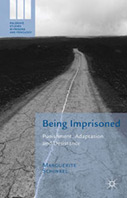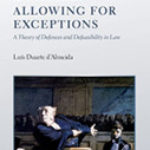Being Imprisoned: Punishment, Adaptation and Desistance

Author: Marguerite Schinkel
Publisher: New York: Palgrave Macmillan, 2014. 192p.
Reviewer: Naomi Couto | November 2015
The book under review has great potential as a hermeneutical understanding of prisons, punishment, and justice. Marguerite Schinkel masterfully and conscientiously brings out prisoner narratives and how they make sense and meaning of prison sentences. Expounding on experiences of punishment in contexts of legitimacy and desistance, the book has the power to unite heterodox criminology with traditional understandings of punishment and process.
Schinkel advances narrative methodology in order to support her argument that, by brining together the existing literature on prison life, desistance, and the purpose and legitimacy of criminal punishment, with the voices of prisoners and how they make sense of their imprisonment, studies on prisons and penology can take on the real societal changes in practice and policy needed to advance social justice as a whole. Schinkel’s thesis advances the notion that “how” long-term prisoners give meaning to their sentence must be contextualized in the pre as well as post understanding prisoners’ have of their life experiences before and after their prison sentence. This type of meaning, generated by prisoners, allows for a more thoughtful approach with processes and studies of desistance. Schinkel argues, “(t)he extent to which a sentence facilitates desistance will depend on how it is perceived and given meaning” (3).
Schinkel’s work notably advances previous studies to support her arguments for prisoner narratives that can develop praxis of study and practice. This allows for mindful research into the dangers of institutionalization and managerialism. If prisons and prison sentences are meant to deliver justice, then the prisoners must also believe in the legitimacy (which must be understood as legitimacies once appreciated through the voices of the inmates) of their sentence: whether distributive or procedural views of fairness (see Schinkel’s use of David Beetham’s work in Chapter 4). Real changes for these prisoners and former prisoners are inextricably connected to how they perceive the fairness of their sentence, access to resources, being heard by their case worker or parole officer, and how they make sense of their sentence. For those in general society, not so interested in the rights of prisoners or former prisoners, this type of research demands their attention as desistance cannot be achieved without understanding the prisoners’ own accounts of “why” they ended up committing another crime (or the initial crime).
In her introductory chapter, Schinkel sets out her road map in thinking about how prisoner perceptions of justice and fairness are linked to desistance. This overall theme is beautifully enhanced by the moral code of “what” prisons are about in democratic societies. The claim is that this form of punishment should protect the public, deter more crime, as well as, rehabilitate the offender. Schinkel calls this type of punishment into account by asking how it can do all this without the actual prisoners having the opportunity to make sense of their imprisonment from their own pre and post biographies. Once the literature review is developed in Chapter 2, Schinkel can then “explore whether the meanings ascribed by prisoners to their sentence align with the stated aims of punishment and whether their accounts suggest that these aims are achieved” (12) in the rest of the book. Here, Schinkel is able to go beyond theoretical understandings of adaptation and desistance since she hears them materialize throughout the voices of her interviewees, as they relate their stories through the lens of “the prison environment and the story they wanted to tell about their lives” (125).
Schinkel’s work excitingly anticipates the valuation and cost accounts of implementing less managerial types of prisons. She looks to the overall sense of a stronger society by taking care of its most vulnerable citizens. If preventing future crime and desistance are truly aims of the justice system, Schinkel argues that we hear the voices of those who have been through the punishment: they call for consistency in applying sentences; greater individual attention; positive relationships with staff; better methods to stay in touch with family and loved ones; and once on licence, judicial rehabilitation (see Schinkel’s use of Maruna’s 2011 arguments on this subject in Chapter 6) amongst other needs. Many of these changes are cost effective and, in the long-term, would advance the goals of the justice system. Schinkel adds, “(t)here is a danger that the frustration many felt as a consequence might lead them to (a return to) … offending. Might it, in the end, be those who do find more suitable hooks for change and realise some early goals, thereby moving towards ‘making good’, at least in their own eyes, who will manage to sustain desistance?” (118).
Schinkel’s accomplishment is a type of merger between prisoners’ rights and the need for a better-informed public in order to effect real policy changes. This contribution is quite useful to demonstrate the fruitfulness and excitement of narrative methodologies as they can enhance much needed changes in prison administration. Schinkel demonstrates an awareness of the shortcomings of this type of research but she also advances and convincingly argues for its strengths as out weighing any limitation. Her understanding of how meaning is made by her interviewees is powerful and it stimulates much needed attention to the acclaimed goals of rehabilitation and reintegration that as a society we claim to have but do little to achieve.
Work Cited
Maruna, S. (2011). Judicial Rehabilitation and the ‘Clean Bill of Health’ in Criminal Justice. European Journal of Probation, 3(1), 97-117.
Naomi Couto, Assistant Professor,
School of Public Policy and Administration
Coordinator, York Collegium for Practical Ethics,
York University


